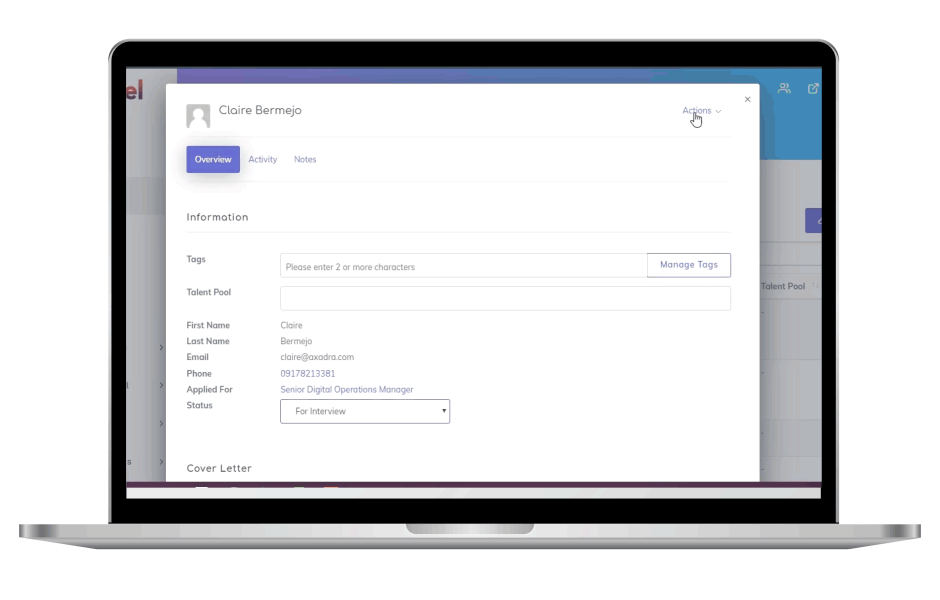Nowadays, almost everyone is digitally connected through social media, making it one of the most important parts of our lives. This platform influences how we interact, share, and express ourselves. It’s no surprise that many employers are checking candidates’ social media before hiring.
The allure of gaining deeper insights into potential hires beyond their resume is undeniable, but it comes with its own set of challenges and ethical considerations. In this article, we will explore the practice of checking a candidate’s social media before hiring, weighing the pros and cons, offering guidance on what to look out for, and providing tips for its responsible use.
What Are Social Media Background Checks?
A social media background check, also known as a social media screening or online reputation check, involves scrutinizing a job applicant’s social media profiles and online presence to gather information that might not be apparent on their resume. Recruiters and hiring managers use platforms like Facebook, Twitter, Instagram, LinkedIn, and social media recruiting tools to get a sense of a candidate’s character, behavior, and interests.
Pros and Cons of Social Media Checks in Recruitment
The practice of using social media in recruitment and selection has gained traction in recent years, presenting both advantages and disadvantages for employers. Understanding these pros and cons is crucial to making informed decisions when integrating social media checks into the recruitment and selection process.
Pros
Check Culture Fit
One of the most significant advantages of using social media for screening is the ability to assess a candidate’s cultural compatibility with your organization. Traditional resumes and interviews often provide a limited glimpse into a person’s personality and values.
Social media profiles can reveal hobbies, interests, affiliations, and other personal aspects that are not readily evident on a CV. By scrutinizing these digital footprints, employers can gain valuable insights into whether a candidate aligns with the company’s culture and values, promoting a harmonious work environment. This can also help you prepare culture-fit interview questions and make the interaction more fruitful.
Identify Warning Signs
In addition to assessing cultural fit, using social media to screen job applicants can help employers uncover potential warning signs or red flags that might not emerge during interviews or on a resume. Problematic behavior, such as discriminatory comments, aggressive language, or inappropriate content, may be revealed on a candidate’s public profile. Detecting these issues early in the hiring process can prevent future conflicts or disruptions within the organization.
Learn About the Candidate as a Person
Resumes are designed to highlight professional achievements, but they often leave out the human side of a candidate. Social media platforms provide a window into a person’s life outside of work, revealing hobbies, passions, and personal values. This insight can be instrumental in understanding what makes a candidate tick, which can be invaluable in determining if they are a good fit for your company.
Find Out How the Candidate Conducts Themselves in Public
How a candidate behaves and communicates in public spaces, such as social media, can be indicative of their professionalism and social skills. Are they courteous, respectful, and considerate in their interactions, or do they display behavior that may be detrimental to the workplace? A public social media presence can provide a glimpse into these aspects, helping employers assess how candidates present themselves to the world.
Reconfirm Details in the Resume
Resumes serve as a candidate’s initial introduction, but they may not always provide the full story. Social media can serve as a verification tool, allowing employers to cross-check information provided on a resume.
For instance, work-related achievements and experiences mentioned on a resume can be confirmed by reviewing the candidate’s professional profiles, such as LinkedIn. This validation helps ensure the accuracy and authenticity of the candidate’s qualifications.
Cons
Duplicate Profiles
One of the common challenges employers encounter when using social media to screen candidates is the presence of duplicate or fraudulent profiles. Some candidates may have multiple profiles on different platforms, making it challenging to determine which one is the authentic representation. This can lead to confusion and ambiguity, potentially resulting in the misjudgment of candidates.
Unverifiable Information
While social media can provide valuable insights, it’s important to remember that not all information found online is verifiable. Candidates may exaggerate or fabricate their online persona, posting content or information that doesn’t necessarily reflect their true selves. This unverifiable nature of online information underscores the importance of using social media checks as a secondary way to conduct reference checks rather than a primary source of evaluation.
Candidate Discrimination
The practice of screening candidates on social media can unintentionally lead to discrimination based on personal attributes, including age, gender, race, religion, or political beliefs. Employers must be cautious not to make hiring decisions based on these protected characteristics, as it can result in legal consequences and damage to the organization’s reputation.
Privacy Issues
Invading a candidate’s personal space by scrutinizing their social media profiles can raise valid privacy concerns. In some regions and jurisdictions, employers may be legally restricted from accessing certain personal information about candidates. It’s vital to respect candidates’ privacy and adhere to applicable laws and regulations when conducting social media checks.
Time Consumption
The process of searching through candidates’ social media profiles can be time-consuming, potentially slowing down the hiring process. In today’s fast-paced job market, delays in hiring can result in the loss of top talent to competing organizations. Employers must carefully balance the potential benefits of social media checks with the time investment required to perform them.
What to Look Out for When Using Social Media to Screen Job Applicants
When conducting social media background checks, it’s essential to focus on specific areas and avoid making subjective judgments. Here’s what you should be looking out for:
- Problematic Comments: Pay attention to comments that may demonstrate intolerance, prejudice, or an inability to work well with diverse teams.
- Explicit Content: Be wary of any explicit or offensive content that may reflect poorly on a candidate’s professionalism.
- Possible Illegal Activity: If you come across posts or images indicating illegal activities, it’s essential to consider the implications for the role you’re hiring for.
- Violent Language or Behavior: Posts containing violent language or indicating aggressive behavior can be a cause for concern.
Tips on Using Social Media in Recruitment and Selection
While social media background checks can be a valuable tool, they must be conducted responsibly and ethically. Here are some tips for effectively integrating social media checks into your hiring process:
- Develop Policies: Establish clear, well-defined policies and guidelines for social media checks that all team members involved in hiring must follow.
- Ask for Consent: Seek the candidate’s consent to perform social media checks, ensuring that they are aware of and comfortable with this aspect of the selection process.
- Strictly Review Public Information: Only review information that is publicly available, and do not attempt to access private accounts or request candidates’ login credentials.
- Document Your Findings: Maintain a record of your findings, and make hiring decisions based on concrete evidence rather than subjective judgments.
Fine-Tune Your Background Checks With Social Media
Social media background checks can provide valuable insights into job applicants, aiding in the evaluation of culture fit, identifying warning signs, and offering a more comprehensive understanding of candidates. However, it is crucial to balance the benefits with the potential downsides, such as discrimination, privacy concerns, and time consumption.
When used responsibly, social media checks can be a helpful tool in the hiring process. But it’s essential to be transparent with candidates, respect their privacy, and establish clear policies to ensure fairness and compliance with applicable laws. Ultimately, the goal is to create a balanced approach that aids in finding the best candidates while maintaining ethical and respectful hiring practices.



















